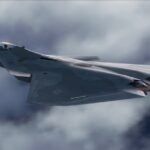
Developing space sensors for detection and tracking is the most significant challenge for the budding U.S. hypersonic missile defense effort, according to a new Center for Strategic and International Studies (CSIS) report. The U.S. Space Force looks to develop and field the Northrop Grumman [NOC] Next Generation Overhead Persistent Infrared (Next-Gen OPIR) constellation, while the Space Development Agency (SDA) is working on its tracking and transport layers, to help defeat Chinese and Russian hypersonic missiles. The nation's current ballistic missile…











